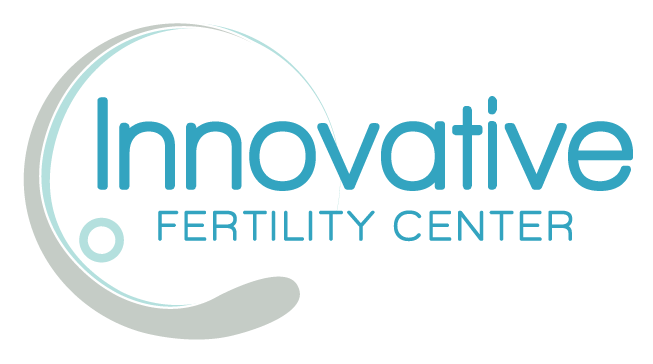
COMPASSIONATE CARE DURING PCOS AWARENESS MONTH
This PCOS Awareness Month, Innovative Fertility Center reaffirms our commitment to supporting women affected by this condition. We understand that PCOS can feel overwhelming, but you don’t have to face it alone. Our experienced team is here to provide the guidance, medical expertise, and compassionate care you deserve. If you suspect PCOS is affecting your health or fertility, we encourage you to take the first step toward answers. Call our office today to schedule a consultation and begin your journey toward better health and hopeful parenthood.
FAQs About PCOS & Your Options
Can younger women develop PCOS?
Yes, PCOS can affect younger women & even teenagers. Once a young woman begins menstruating, she may start experiencing symptoms such as irregular cycles, acne, excess hair growth, or weight changes. While it is most commonly diagnosed in women in their 20s and 30s, early recognition and management during adolescence can help reduce long-term health risks and improve overall well-being.
Is PCOS linked to infertility?
Yes, PCOS is one of the most common causes of infertility in women. Hormonal imbalances can prevent regular ovulation, making it difficult to conceive naturally. However, not all women with PCOS struggle with infertility. With proper treatment, including lifestyle changes, ovulation-stimulating medications, intrauterine insemination (IUI), or in vitro fertilization (IVF), many women with PCOS are able to achieve a healthy pregnancy.
Does PCOS increase the risk of other health conditions?
Yes, PCOS is linked to several long-term health risks. Women with PCOS are more likely to experience insulin resistance, type 2 diabetes, high blood pressure, and high cholesterol. Additionally, when ovulation does not occur regularly, prolonged exposure to estrogen can increase the risk of endometrial hyperplasia and uterine cancer. Because of these risks, ongoing monitoring and proactive treatment are essential.
Is PCOS treatable?
While there is no cure for PCOS, it is a highly manageable condition. Treatment often depends on a woman’s symptoms and fertility goals. Options may include dietary and lifestyle changes, medications such as birth control pills, and fertility treatments like IUI or IVF for those trying to conceive. With the right care plan, women with PCOS can manage symptoms, reduce long-term health risks, and improve their quality of life.
What You Need to Know About PCOS and Diagnosis
Polycystic Ovary Syndrome (PCOS) is a complex hormonal condition that affects an estimated 5–10% of women of reproductive age, making it one of the leading causes of female infertility. The condition is characterized by an imbalance of reproductive hormones that can interfere with the development and release of eggs during ovulation. Many women with PCOS develop fluid-filled sacs, or cysts, on their ovaries that can range in size from as small as a pearl to as large as a golf ball.
However, not every woman with PCOS have cysts, and not everyone with cysts have PCOS. Symptoms can begin as early as adolescence and may include irregular menstrual cycles, acne, hair growth on the face or body, and weight fluctuations. While PCOS often impacts fertility, it’s important to note that many women with this condition are still able to conceive naturally with the right medical support.
Diagnosing Polycystic Ovary Syndrome (PCOS) can be challenging because there isn’t a single test that provides a clear answer. Instead, a thorough evaluation is required to piece together the full picture of your reproductive health. At Innovative Fertility Center, Dr. Berger and our team begin with a comprehensive medical history to understand your symptoms, cycle patterns, and overall health. A physical exam is performed to check for signs of hormonal imbalance, such as acne or excess hair growth. Blood work helps measure hormone levels, insulin resistance, and cholesterol. In addition, an ultrasound allows us to evaluate the ovaries and detect the presence of multiple small cysts. Together, these steps help us determine whether PCOS may be affecting ovulation and your ability to conceive.
Treatment for PCOS
Treating PCOS is highly individualized because the condition can impact women in different ways. For some, lifestyle changes such as balanced nutrition, exercise, and weight management can help regulate menstrual cycles and reduce insulin resistance. In cases where additional medical support is needed, medications like Metformin may be prescribed to improve insulin sensitivity, while fertility medications can help stimulate ovulation. For patients struggling with infertility, advanced treatments such as intrauterine insemination (IUI) or in vitro fertilization (IVF) may be recommended. Throughout the process, our Manhattan Beach fertility team works closely with you to create a plan that not only addresses your fertility goals but also safeguards your long-term health.
Innovative Fertility Center
What is Polycystic Ovary Syndrome?
Polycystic ovary syndrome (PCOS) is a hormonal, genetic, and metabolic disorder that causes women to produce higher-than-normal levels of androgens. While both men and women produce androgens, PCOS inflates these levels in women, disrupting ovulation and potentially leading to infertility. Common symptoms include irregular menstrual cycles, excess body hair, acne, and darkened skin patches. Know that you are not alone in experiencing the challenges of PCOS.
At Innovative Fertility Center, Dr. Berger and our team of specialists provide expert care for women struggling with PCOS. We offer comprehensive fertility evaluations to identify PCOS and other potential causes of infertility, helping you manage your symptoms and restore reproductive health.
Success Story

“We cannot thank Innovative Fertility enough! They helped give us our miracle baby and we will forever be grateful for the amazing team!”
★★★★★
Alexa A.
SPEAK WITH OUR TEAM – Contact Us
